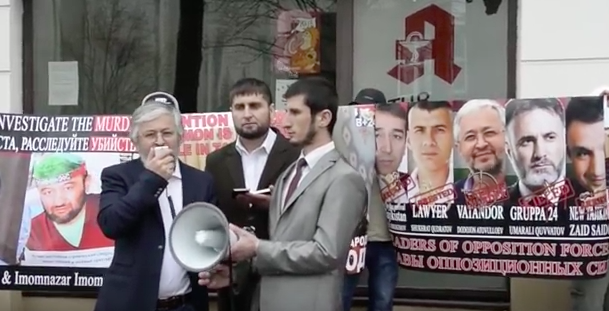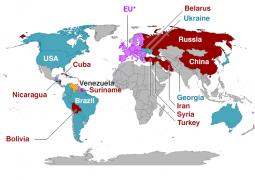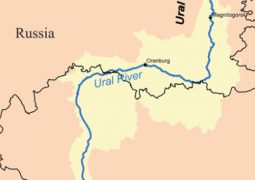Tajikistan: Asylum Seekers Stranded in Limbo on Polish Border

On the 8.28 a.m. train to Terespol, a Polish town at the border with Belarus, Ali watches the barely changing landscape with indifference. This might be the twentieth time he has taken this train with his wife and three kids. Or maybe the twenty-first, he cannot quite remember.
Ali, a well-built young man with dark eyes and a doleful smile, is a member of the Islamic Renaissance Party of Tajikistan (IRPT). He is also one of countless Tajiks forced to flee his homeland due to a wave of political repression, including a ban of the IRPT in September 2015.
Escape from Tajikistan has taken people like Ali through Belarus and up to the edge of the European Union, where they have found the door slammed in their face.
The unwritten rule for those without visas and hoping to claim asylum in Poland is to travel in the crowded final sleeper carriage. Some of the passengers chat in the dark, others are frozen, anxiously waiting. Maybe this will be the time they are allowed into Poland. Ali’s children play and misbehave. They have taken this route so often it has almost become a daily routine.
Ali and his family spend their days in Brest, a Belarusian city whose outskirts push up against the western Polish border. The kids do not play outside, nor do they go out much at all. For reasons of security, they live, play, sleep and eat in a hotel room rented out by their parents.
According to data provided by Poland’s Office for Foreigners, a growing number of Tajik nationals began claiming asylum toward the end of 2015, as the crackdown back home was picking up steam. Most chose the border crossing at Terespol, as it is easily accessed by train from Moscow or Minsk.
The number of claims peaked last May, when 129 individuals applied for international protection — compared with 18 the same month a year earlier. In recent months, the number has been declining. Only four asylum applications were registered in November. At the same time, according to data provided by the Polish Border Guard, between January and October 2016, 5,503 Tajik nationals were denied entry into Poland, a surge from 1,896 over the same period in 2015. The figure covering Russian nationals, mostly of Chechen origin, is even greater, standing at more than 68,000 in 2016.
Since the summer of 2016, Poland’s border with Belarus has been experiencing its own small-scale migration crisis. And while the right to seek refuge is a universal right provided under EU and Polish law, the Polish border agency began a large-scale refusal of entry for asylum seekers, claiming that they tried to enter the country without a valid visa, which is not required when applying for refugee status.
Marta Szczepanik, an immigration expert with the Warsaw-based Helsinki Foundation for Human Rights, said the number of people being turned away at the Polish border in 2016 reached unprecedented levels. Human Constanta, a Belarusian human rights organization that assists would-be asylum seekers in Brest, has said that during the peak months of drama in August and September, up to 3,000 people were living in the city hoping to be allowed into Poland.
As Russian citizens, Chechen migrants have been able to rent private accommodation and stay in Belarus without registration for up to 90 days. The situation for those from Tajikistan is more complicated. Tajiks are forced to stay in overpriced hotels that can officially register their stay in Belarus. After 90 days, they are no longer allowed to remain in the country. Tajiks can, in special circumstances, apply for a temporary residence in Belarus for up to one year, but few either know about the loophole or choose to avail themselves of it.
In December, Ali and his family were coming to the end of their allowed period. With one day left before their stay in Belarus legally expired, they were again turned back at the border with Poland, and denied the right to claim asylum.
The reasons why migrants are not allowed to claim asylum in Poland are unclear. According to Dariusz Sienicki, a spokesperson for the Border Guard, there were no instances of people being refused the opportunity to apply for refugee status. But human rights groups working with the migrants, as well as the asylum seekers themselves, contend otherwise.
Failure is sometimes the outcome of procedural errors.
According to the Terespol monitoring mission of the office of the Polish Ombudsmen for Human Rights, which is the only body allowed to observe the interview process at the border, the majority of migrants fail to directly request asylum in conversations with the border guards. A number of those who do ask are denied entry to Poland anyhow.
This constitutes a clear violation of international refugee law and the right to asylum, especially since Polish law dictates that the Office for Foreigners, and not the Border Guard, is responsible for handling asylum applications. The Border Guard, therefore, is making decisions outside its purview, while the Polish Office for Foreigners has no representatives at the border.
Szczepanik said denying that a migrant has expressed his or her will to claim asylum has become a common explanation used by authorities. Another problem, Szczepanik added, is methodological. “The questions asked by the border guards are often put in such a way to prove the preponderance of economic factors behind migration, while the part of the story suggesting persecution is usually not pursued,” she said.
As Anna Cieślewska, a Central Asia expert from the Jagiellonian University, explained, the persecution in Tajikistan of the IRPT and its supporters dates back several years, to around 2010, when the government sought to set strict rules on religious life under the pretext of combating Islamic extremism. Repression reached a new level of intensity in September 2015, after an alleged coup attempt by a disaffected deputy defense minister was linked to the party.
The Polish government’s reluctance to acknowledge this downturn has exasperated rights advocates.
Tajikistan’s human rights crackdown “requires the European Union, including Poland, to provide protection for those who have been persecuted on political grounds,” Steve Swerdlow, Human Rights Watch’s Central Asia researcher, told EurasiaNet.org. “It also requires that the right to asylum be protected and implemented consistent with Warsaw’s international obligations, rather than the blatant attempt to do an end-run around refugee law.”
There are multiple examples of Tajik authorities taking their hunt of the opposition beyond their own borders. Maksud Ibragimov, a young Russia-based opposition activist, was stabbed in Moscow in late 2014, and weeks later forcibly deported to Tajikistan, where he was charged with extremism and imprisoned for 17 years. In March 2015, the leader of the anti-government Group 24, Umarali Quvvatov, was assassinated in Istanbul after Turkish authorities refused his extradition to Tajikistan. Rights activists suspect Quvvatov’s killing was the handiwork of people working at the Tajik government’s behest.
Other times, the government in Dushanbe has used international extradition treaties to repatriate critics.
In June 2015, Polish authorities denied Shabnam Khudoydodova, who came to the attention of Tajik authorities for social media postings critical of the government, entry into Poland. Upon her return to Brest, Khudoydodova was stopped by Belarusian police and detained on terrorism charges. The Tajik government had placed her name on an Interpol wanted list, and requested her extradition. Khudoydodova claims that after her arrest she was visited in her cell by Tajik special services officers and beaten.
It took nine months of interventions from international human rights groups and the United States Embassy in Belarus to secure Khudoydodova’s release and passage into Poland, where she is now awaiting a decision on her asylum application.
Cieślewska said there are a few possible factors behind Poland’s hardline position on Tajik and other asylum seekers. One is a perception that large numbers of economic migrants have sought to ride the coattails of people subject to political repression. Economic decline in Russia has left its toll on conditions all across the former Soviet Union, including in Tajikistan. The economic fallout is compelling many would-be labor migrants to look further afield for places to live and work.
Also, Cieślewska noted that in 2015 around 90 percent of the 500 or so applications for asylum submitted by citizens of Tajikistan in Poland were withdrawn, most likely because the applicants moved onward to other western European countries, where salaries are higher and Tajik communities are more vibrant. Given that Berlin hosts the headquarters of the IRPT, the majority of political dissidents aspire to move to Germany.
The stricter admission policy adopted by the Polish authorities could be a response to pressure from within the EU, in particular from Germany, which is struggling to cope with its own massive influx of refugees. Many view Poland as merely a transit point on their way to other destinations, namely Germany. While experts have speculated on the possibility of behind-the-scenes diplomatic wrangling, there is no hard evidence to prove such a claim.
According to the data provided by Poland’s Office for Foreigners, in 2016, 13 Tajik nationals were granted refugee status or another form of international protection in Poland. Another 633 applications were discontinued, most of them due to the absence of the applicant. Six people were sent back to Tajikistan.
This is clearly bad news for Ali and fellow dissidents trying to reach Poland. While the number of families remaining in Brest is slowly declining, and it seems that the worst crisis is over, those escaping Tajikistan in search of international protection remain bereft of escape routes.
Agnieszka Pikulicka-Wilczewska is a freelance journalist covering the post-Soviet space.
- Previous Tajikistan Pumps Mobile Phone Companies for Cash With Dubious Fines
- Next Kazakhstan Cracks Down on Anonymous Internet Comments










